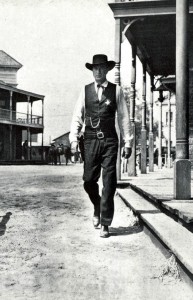Dean and Sherry Buescher filed for bankruptcy; First United Bank opposed their discharge, and won. Sherry Buescher argued on appeal that the bank lacked standing, because she did not personally guarantee the loans at issue. The Fifth Circuit disagreed, noting that because Texas is a community property state, the bank could sue in rem in Texas to collect her husband’s guaranty obligation from community property. Buescher v. First United Bank & Trust, No. 14-40361 (April 15, 2015).
Monthly Archives: April 2015
 Chester sued DIRECTV for age discrimination; it moved to compel arbitration. Chester swore: “I do not remember signing any arbitration agreement, and dispute that I signed an arbitration agreement with Directv, LLC at anytime. . . . Had I been offered an arbitration agreement I would have attempted to continue my employment without signing it, and only would have signed it if the employer threatened to terminate me if it was not signed. . . . If I was threatened with termination if I did not sign an arbitration agreement I would remember it. Since I do not remember any such threat I am sure I did not sign an arbitration agreement.”
Chester sued DIRECTV for age discrimination; it moved to compel arbitration. Chester swore: “I do not remember signing any arbitration agreement, and dispute that I signed an arbitration agreement with Directv, LLC at anytime. . . . Had I been offered an arbitration agreement I would have attempted to continue my employment without signing it, and only would have signed it if the employer threatened to terminate me if it was not signed. . . . If I was threatened with termination if I did not sign an arbitration agreement I would remember it. Since I do not remember any such threat I am sure I did not sign an arbitration agreement.”
DIRECTV, admitting that it lost the arbitration agreement, argued that it had a practice of having employees sign one of two form agreements. The Fifth Circuit was unimpressed, noting that the two agreements contained substantial substantive differences. DIRECTV sought solace in the fact that it had lost Chester’s entire file, not just the arbitration agreement; the Court noted that DIRECTV was unable to provide arbitration agreements for 26 of the 87 other employees in the relevant office. In sum: “Considering the entire record, it is clear that, somewhere along the way, DIRECTV’s purported practice of collecting and filing arbitration agreements for all new employees broke down . . . .” Chester v. DIRECTV, LLC, No. 14-60247 (April 29, 2015, unpublished).
 The Songs deposited $361,200 as earnest money, toward the purchase of a $3.4 million apartment complex. They then made the successful bid in an auction process, but backed out of the transaction and refused to close. The Fifth Circuit affirmed the district court’s ruling that the seller could keep the money. It found that the parties’ agreement had consideration, most notably in the seller’s commitment to review, consider, and accept the Songs’ bid. It also found that the earnest money was a proper liquidated damages award for the Songs’ termination, finding that it “is reasonable and actual damages were uncertain.” Song v. 4170 & 4231 & 4271 Altoona Drive Holdings LP, No. 14-11059 (April 8, 2015, unpublished).
The Songs deposited $361,200 as earnest money, toward the purchase of a $3.4 million apartment complex. They then made the successful bid in an auction process, but backed out of the transaction and refused to close. The Fifth Circuit affirmed the district court’s ruling that the seller could keep the money. It found that the parties’ agreement had consideration, most notably in the seller’s commitment to review, consider, and accept the Songs’ bid. It also found that the earnest money was a proper liquidated damages award for the Songs’ termination, finding that it “is reasonable and actual damages were uncertain.” Song v. 4170 & 4231 & 4271 Altoona Drive Holdings LP, No. 14-11059 (April 8, 2015, unpublished).
 Several investors in the ill-fated Stanford scheme sued Pershing LLC, who provided clearing services to the Stanford Group. Many of the investors had contracts with Pershing that required arbitration with FINRA, but one group did not, and sought to compel arbitration based on estoppel theories. As to a “direct benefits” theory, the Fifth Circuit found “no evidence that Pershing was aware that [the investors] had executed contracts to purchase CDs from the Stanford entities,” reminding that “a nonsignatory’s generalized sense that the two contracting parties have a course of dealing will not satisfy this requirement.” Accordingly, the Court affirmed the denial of the plaintiffs’ motion to compel arbitration.
Several investors in the ill-fated Stanford scheme sued Pershing LLC, who provided clearing services to the Stanford Group. Many of the investors had contracts with Pershing that required arbitration with FINRA, but one group did not, and sought to compel arbitration based on estoppel theories. As to a “direct benefits” theory, the Fifth Circuit found “no evidence that Pershing was aware that [the investors] had executed contracts to purchase CDs from the Stanford entities,” reminding that “a nonsignatory’s generalized sense that the two contracting parties have a course of dealing will not satisfy this requirement.” Accordingly, the Court affirmed the denial of the plaintiffs’ motion to compel arbitration.
In Barzelis v. Flagstar Bank, F.S.B., No. 14-10782 (Apr. 22, 2015), the Fifth Circuit addressed the preemption of state-law mortgage claims under “HOLA,” the Home Owners’ Loan Act of 1933, a statute governing federal savings associations. The Court held:
1. Notice and cure. “It may be the case, for example, that a state law regulating interest-rate adjustments to protect borrowers is preempted by HOLA. But that does not prevent a bank and a borrower from voluntarily agreeing to substantially the same protections in their contract . . . .”
2. Misrepresentation. “[W]here a negligent-misrepresentation claim is predicated not on affirmative misstatements but instead on the adequacy of disclosures or credit notices, it has a specific regulatory effect on lending operations and is preempted.”
3. Debt collection. Consumer protection laws “‘that establish the basic norms that undergird commercial transactions’ do not have more than an incidental effect on lending and thus escape preemption.”
 Halliburton obtained an injunction in an arbitration against a former employee. The employee sought vacatur under the FAA, arguing that it allows judicial review of an injunction for vagueness. After reviewing some dispute as to whether such review is allowed after Hall Street, the Court rejected the challenge. The employee challenged a provision that enjoined him from “utilizing in any fashion” certain documents “that concern [Halliburton’s] products or services, arguing that “utilization” was undefined, the limitation had no time period, and the document description was vague. The Court found that, “read in context,” it was clear that the arbitrator was referring to material that the employee had improperly taken from Halliburton. Because this gave the employee “fair notice of what he may, and must not, do,” it was “clearly capable of being implemented and enforced.” McVay v. Halliburton Energy Services, No. 10-10172 (April 22, 2015). The entire injunction appears on pages 6-7 of the opinion and is of general interest to noncompete and trade secret litigation.
Halliburton obtained an injunction in an arbitration against a former employee. The employee sought vacatur under the FAA, arguing that it allows judicial review of an injunction for vagueness. After reviewing some dispute as to whether such review is allowed after Hall Street, the Court rejected the challenge. The employee challenged a provision that enjoined him from “utilizing in any fashion” certain documents “that concern [Halliburton’s] products or services, arguing that “utilization” was undefined, the limitation had no time period, and the document description was vague. The Court found that, “read in context,” it was clear that the arbitrator was referring to material that the employee had improperly taken from Halliburton. Because this gave the employee “fair notice of what he may, and must not, do,” it was “clearly capable of being implemented and enforced.” McVay v. Halliburton Energy Services, No. 10-10172 (April 22, 2015). The entire injunction appears on pages 6-7 of the opinion and is of general interest to noncompete and trade secret litigation.
 Plaintiff alleged birth defects from the prescription of metoclopramide, off-label, to control nausea during pregnancy. The prescribing doctor gave “unequivocal” deposition testimony that he chose the medicine because of his clinical experience, and had no contact with marketing efforts by the drug manufacturer. Accordingly, preempted or not, plaintiff’s claims failed for lack of causation. Whitener v. Pliva, Inc., No. 14-30468 (April 9, 2015, unpublished).
Plaintiff alleged birth defects from the prescription of metoclopramide, off-label, to control nausea during pregnancy. The prescribing doctor gave “unequivocal” deposition testimony that he chose the medicine because of his clinical experience, and had no contact with marketing efforts by the drug manufacturer. Accordingly, preempted or not, plaintiff’s claims failed for lack of causation. Whitener v. Pliva, Inc., No. 14-30468 (April 9, 2015, unpublished).
Continuing an earlier post about how to sign documents, the issue of effective consent again appeared in Berry v. Fannie Mae, No. 14-10474 (April 17, 2015, unpublished). A mortgage servicer sent a trial payment plan to a borrower, which said: “This Plan will not take effect unless and until both the Lender and I sign it and Lender provides me with a copy of this Plan with the Lender’s signature.” Rejecting an argument that the servicer’s letter acknowledging the borrower’s signature waived this language, the Court enforced it and affirmed dismissal of the borrower’s claims. A similar analysis led to a similar result in Williams v. Bank of America, No. 14-20520 (May 7, 2015, unpublished).
The Cantus filed for Chapter 11 bankruptcy, and after their case was converted to Chapter 7, sued their bankruptcy attorney for malpractice. That suit settled for roughly $300,000, leading to a dispute between the Cantus and the Chapter 7 Trustee as to who should receive the proceeds. The Fifth Circuit found that the estate suffered pre-conversion injury as a result of the alleged misconduct, including diversion of assets, time wasted with an unconfirmable Chapter 11 plan, and additional attorneys fees. Therefore, the causes of action against the attorney “accrued prior to conversion and belong to the estate.” Cantu v. Schmidt, No. 14-40597 (April 17, 2015).
 Lito Asignacion, a Filipino seaman, worked aboard the M/V RICKMERS DALIAN (right, en route to Antwerp at the time of this post) – a “superflex heavy” container ship owned by a German company and flying the flag of the Marshall Islands. Severely burned in an onboard accident, he went to arbitration in the Phillippines under Filipino law, and received an award of $1,700 — significantly less than U.S. maritime law would afford. The district court refused to enforce the award on public policy grounds, and the Fifth Circuit reversed. Asignacion v. Rickmers Genoa, No. 14-30132 (April 16, 2015). Acknowledging the strong U.S. policy that gives “special solicitude to seamen” and treats them as “wards of admiralty,” the Court found it outweighed by the policy in favor of arbitration, coupled with unique considerations about the legal arrangements under which Filipino citizens find employment at sea. It also rejected a challenge based on the “prospective waiver” doctrine, finding that the Supreme Court had not extended it beyond purely statutory rights.
Lito Asignacion, a Filipino seaman, worked aboard the M/V RICKMERS DALIAN (right, en route to Antwerp at the time of this post) – a “superflex heavy” container ship owned by a German company and flying the flag of the Marshall Islands. Severely burned in an onboard accident, he went to arbitration in the Phillippines under Filipino law, and received an award of $1,700 — significantly less than U.S. maritime law would afford. The district court refused to enforce the award on public policy grounds, and the Fifth Circuit reversed. Asignacion v. Rickmers Genoa, No. 14-30132 (April 16, 2015). Acknowledging the strong U.S. policy that gives “special solicitude to seamen” and treats them as “wards of admiralty,” the Court found it outweighed by the policy in favor of arbitration, coupled with unique considerations about the legal arrangements under which Filipino citizens find employment at sea. It also rejected a challenge based on the “prospective waiver” doctrine, finding that the Supreme Court had not extended it beyond purely statutory rights.
 Two principles – somewhat inconsistent – govern whether a court should accept an untimely request for jury trial. First, “‘because the seventh amendment confers a fundamental right,'” a court “typically ‘should grant a motion for jury trial . . . in the absence of strong and compelling reasons to the contrary.'” Second, “it is not an abuse of discretion to deny an untimely motion for a jury trial ‘when the failure to make a timely jury demand results form mere inadvertence on the part of the moving party.'” In BPRE, LP v. RML Waxahachie Dodge, LLC, under the operative scheduling order, the plaintiff had to make a request for a pretrial conference by January 31, 2010. It did not do so until February 16, and did not file a separate brief about the right to jury trial until April 12. The Fifth Circuit found no abuse of discretion in the trial court’s conclusion that this was “mere inadvertence,” and affirmed the finding of waiver. No. 14-50339 (April 7, 2015, unpublished).
Two principles – somewhat inconsistent – govern whether a court should accept an untimely request for jury trial. First, “‘because the seventh amendment confers a fundamental right,'” a court “typically ‘should grant a motion for jury trial . . . in the absence of strong and compelling reasons to the contrary.'” Second, “it is not an abuse of discretion to deny an untimely motion for a jury trial ‘when the failure to make a timely jury demand results form mere inadvertence on the part of the moving party.'” In BPRE, LP v. RML Waxahachie Dodge, LLC, under the operative scheduling order, the plaintiff had to make a request for a pretrial conference by January 31, 2010. It did not do so until February 16, and did not file a separate brief about the right to jury trial until April 12. The Fifth Circuit found no abuse of discretion in the trial court’s conclusion that this was “mere inadvertence,” and affirmed the finding of waiver. No. 14-50339 (April 7, 2015, unpublished).
 Several insurance-related businesses had a dispute. The businesses were not all parties to all relevant agreements, leading to confusion about whether arbitration should proceed with the AAA or ICC, and about how to select an arbitrator. The district court found that the arbitrator was not appointed correctly, vacated the award, and the Fifth Circuit affirmed: “Arbitration is simply a matter of contract between the parties; it is a way to resolve those disputes — but only those disputes — that the parties have agreed to submit to arbitration.” Poolre Ins. Corp. v. Organizational Strategies, Inc., No. 14-20433 (April 7, 2015). Interestingly, the relevant contract required arbitrator selection “by the Anguilla, [British West Indies] Director of Insurance” — a nonexistent position. This error did not moot that provision, however, but simply implicated the section 5 of the FAA, which lets a district judge appoint an arbitrator if “a lapse in the naming of an arbitrator” arises.
Several insurance-related businesses had a dispute. The businesses were not all parties to all relevant agreements, leading to confusion about whether arbitration should proceed with the AAA or ICC, and about how to select an arbitrator. The district court found that the arbitrator was not appointed correctly, vacated the award, and the Fifth Circuit affirmed: “Arbitration is simply a matter of contract between the parties; it is a way to resolve those disputes — but only those disputes — that the parties have agreed to submit to arbitration.” Poolre Ins. Corp. v. Organizational Strategies, Inc., No. 14-20433 (April 7, 2015). Interestingly, the relevant contract required arbitrator selection “by the Anguilla, [British West Indies] Director of Insurance” — a nonexistent position. This error did not moot that provision, however, but simply implicated the section 5 of the FAA, which lets a district judge appoint an arbitrator if “a lapse in the naming of an arbitrator” arises.
The panel has been announced for Friday’s arguments in “the immigration case,” Texas v. United States: Judges Smith, Elrod, and Higginson. Like the recent panel in Crane v. Johnson (No.14-10049, April 2, 2015), this panel draws from the major “wings” of the Court – a senior Reagan appointee, a recent Bush appointee (both from Texas) and the second-newest appointee by Obama.
The similarity of panel makeup suggests the potential for a similar result. Interestingly, while Judge Smith is a strong separation-of-powers conservative (consider his dissent in the en banc False Claims Act case of Riley v. St. Luke’s Episcopal Hospital, 252 F.3d 749 (5th Cir. 2001)) he is also a strong voice for judicial action when there is jurisdiction; for example, he has led the Court toward expanded pretrial oversight of district courts in opinions such as In re: Radmax. Judge Higginson, while new, has a record of thorough opinions that comport with the majority view of legal issues (consider his recent opinion in the False Claims Act case of United States ex rel. Shupe v. Cisco Systems, Inc., 759 F.3d 379 (5th Cir. 2014)). The panel will give the plaintiffs a full hearing but may well find problems with their standing theories.
At the risk of reading one tea leaf too many, it is worth noting that Judge Elrod dissented from the denial of en banc rehearing in Radmax, as well as a recent panel opinion that granted mandamus relief on a forum issue, In re Lloyd’s Register North America, Inc., No. 14-20554 (Feb. 24, 2015). The analogy between the Court’s mandamus jurisdiction and the justiciability issues in Texas v. United States is not powerful – and indeed, Judge Smith was on the opposite side of both matters from Judge Elrod – but it does suggest a healthy concern for judicial constraint.
 A law firm sought $130,000 in fees for representing a bankruptcy debtor; the bankruptcy court awarded $20,000, noting the firm’s lack of success in delivering a measurable benefit to the estate. While a Fifth Circuit panel affirmed, citing the test in In re: Pro-Snax Distributors, Inc., 157 F.3d 414 (5th Cir. 1998), all three judges called for en banc reconsideration of that opinion. That request was granted unanimously in Barron & Newburger, P.C. v. Texas Skyline, Ltd., which recognized that the “retrospective, ‘material benefit’ standard enunciated in Pro–Snax conflicts with the language and legislative history of § 330, diverges from the decisions of other circuits, and has sown confusion in our circuit.” Accordingly, the full Court overturned Pro–Snax’s attorney’s-fee rule to “adopt the prospective, ‘reasonably likely to benefit the estate’ standard endorsed by our sister circuits.” While the division of some en banc votes can offer insight on subtle aspects of judges’ philosophies, this unanimous decision shows that sometimes, the full court will simply fix what it regards as an earlier mistake, if that mistake has sufficiently far-reaching consequences within the Circuit.
A law firm sought $130,000 in fees for representing a bankruptcy debtor; the bankruptcy court awarded $20,000, noting the firm’s lack of success in delivering a measurable benefit to the estate. While a Fifth Circuit panel affirmed, citing the test in In re: Pro-Snax Distributors, Inc., 157 F.3d 414 (5th Cir. 1998), all three judges called for en banc reconsideration of that opinion. That request was granted unanimously in Barron & Newburger, P.C. v. Texas Skyline, Ltd., which recognized that the “retrospective, ‘material benefit’ standard enunciated in Pro–Snax conflicts with the language and legislative history of § 330, diverges from the decisions of other circuits, and has sown confusion in our circuit.” Accordingly, the full Court overturned Pro–Snax’s attorney’s-fee rule to “adopt the prospective, ‘reasonably likely to benefit the estate’ standard endorsed by our sister circuits.” While the division of some en banc votes can offer insight on subtle aspects of judges’ philosophies, this unanimous decision shows that sometimes, the full court will simply fix what it regards as an earlier mistake, if that mistake has sufficiently far-reaching consequences within the Circuit.
Only in New Orleans. During Mardi Gras, a form of folk art takes discarded beads and twists them into a dog shape, also known as a “bead dog.” A seller of king cakes obtained a trademark for its mascot based on that image (below left), and sued a jewelrymaker who sold necklaces and earrings that also drew upon that image (below right).

The Fifth Circuit affirmed summary judgment for the  jewelrymaker, reasoning:
jewelrymaker, reasoning:
1. The bakery’s “Mardi Gras Bead Dog” mark was descriptive of its products;
2. The mark was not inherently distinctive, and thus may be protected only if it had acquired secondary meaning;
3. Under the applicable seven-factor test, the bakery failed to establish that the mark had acquired secondary meaning; and .
4. While a dog itself cannot be copyrighted, its distinctive collar could potentially be, but on this record the Court concluded that no reasonable juror could find the collars to be “substantially similar in protectable expression.”
Other related state law claims were also dismissed. Nola Spice Designs, LLC v. Haydel Enterprises, Inc., No. 13-30918 (April 8, 2015).
 The district court has denied an interim stay of its injunction against the Obama Administration’s immigration policies; the Fifth Circuit has recently rejected, on standing grounds, a comparable case; and oral argument is set for April 17 before the Fifth Circuit on an appellate motion to stay the injunction. I was recently interviewed by Law360 about the matter and anticipate announcement by the Court of the panel for the April 17 argument in the near future.
The district court has denied an interim stay of its injunction against the Obama Administration’s immigration policies; the Fifth Circuit has recently rejected, on standing grounds, a comparable case; and oral argument is set for April 17 before the Fifth Circuit on an appellate motion to stay the injunction. I was recently interviewed by Law360 about the matter and anticipate announcement by the Court of the panel for the April 17 argument in the near future.
A law firm and its client arbitrated a fee dispute. While the arbitrators ruled for the firm, the district court vacated the award as to the contingent fee on the grounds that the fee was unconscionable. The Fifth Circuit reinstated the arbitration award, noting the “extraordinarily narrow” standard of review and the arbitrators’ specific fact findings on the relevant considerations. Campbell Harrison & Dagley LLP v. Hill, No. 14-10631 (April 2, 2015, unpublished). The Court acknowledged, but concluded that it did not need to address, the question whether the ability to vacate an arbitration award on public policy grounds survived Hall Street Associates v. Mattel, 128 S. Ct. 1396 (2008).
Can you believe it is April 2015 already? To review the “top five” opinions from the Fifth Circuit in the area of business litigation from the first quarter, please click here — better-formatted compared to the standard WordPress ordinarily used by the blog.
In Wellness Wireless, Inc. v. Infopia America, LLC, the district court dismissed a suit on a note for lack of subject matter jurisdiction, noting the potential effect on the estate of a company in bankruptcy. The Fifth Circuit faulted this reasoning as “plainly wrong,” noting that Article III courts have jurisdiction over bankruptcy matters and simply refer them to bankruptcy courts as a matter of course. The Court also disagreed as to an alternative ground for dismissal, based on the debtor being a necessary party under Fed. R. Civ. P. 19, noting that the debtor had disclaimed any interest in the funds at issue during the bankruptcy case. No. 14-20024 (March 24, 2015, unpublished).
Satterwhite appealed an adverse ruling from the bankruptcy court, and then to the district court. In the district court, after judgment, he filed a motion for new trial, to modify the judgment, and for findings of fact and conclusions of law. After the trial court denied those motions, he filed a notice of appeal that would have been timely in an “ordinary” appeal under Fed. R. App. P. 4. Unfortunately, this bankruptcy appeal fell under Fed. R. App. P. 6, which only allows a motion for rehearing filed within 14 days of judgment to extend the appellate deadline. Satterwhite v. Guin, No. 14-20430 (March 31, 2015, unpublished).